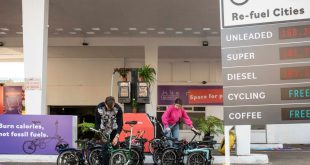European micromobility operator Dott has created a series of visuals showing how Europe’s capital cities could be reimagined with a focus on people rather than cars.
The designs are intended to create discussion and inspire a future where city centres are unlocked from the congestion and pollution of private cars. They have been released to coincide with EU Mobility Week, which takes place from 16-22nd September, and incorporates today’s World Car Free Day.
 Henri Moissinac, co-founder and CEO, Dott, said: “Our cities can be transformed if we think about transport differently. Our fleet of shared e-bikes and e-scooters offer an environmentally friendly service for a single ride, or combined with public transport.
Henri Moissinac, co-founder and CEO, Dott, said: “Our cities can be transformed if we think about transport differently. Our fleet of shared e-bikes and e-scooters offer an environmentally friendly service for a single ride, or combined with public transport.
“Supported by the right infrastructure, efficient, safe and affordable travel is possible without needing cars.”
Across Europe, more people are choosing shared e-scooters and e-bikes to travel around city centres. The majority (58%) do so to save time, and commuting is the most popular reason to use (41%).
Riders believe their choices can positively impact the city, with nearly half (41%) saying their main motivator is to reduce congestion. Around one third (32%) would travel with micromobility more often if there was more safe infrastructure available.
Read more: BikeBiz Awards 2022: The micromobility shortlist
Shared micromobility provider Tier has also revealed that 66% of Londoners feel there are too many cars on the road in the capital, with 73% saying they feel cars are polluting the air in the city.
The findings come from Tier’s perceptions study, a study into micromobility in London since the e-scooter trials began. The study also found that nearly one in five e-scooter hires replaced a car-based journey. It also highlighted some of the barriers to Londoners trying out travelling by bike or by e-scooter, with over a third reporting that they feel exposed to other vehicles on the road and only 50% feeling that cycling is easy and efficient in London.
To help combat the barriers to the adoption of micromobilty, Tier has partnered with Beeline to provide navigation within the Tier app for e-scooter riders. According to a poll of Beeline users, just under 80% said that since using the Beeline app or device they have felt safer whilst riding their bike.
Tier and Beeline are holding a pop-up event on Car Free Day, showcasing how using Beeline’s navigation can route riders onto quieter routes in London. Tier will also have its latest computer-vision equipped ‘Tarsier’ e-scooter and its recently unveiled C1 e-scooter at the event in Southwark. Tier will be giving away free rides on e-scooter for attendees.
Georgia Yexley, Tier’s general manager for the UK and Ireland, said: “The majority of Londoners want to see fewer cars on the streets, but for many people choosing an alternative form of transport like cycling or riding an e-scooter can feel unattainable.
“Through our partnership with Beeline, our users can choose a route which avoids major roads and links up some of the fantastic cycling infrastructure already in the city. This Car–Free Day we would like to encourage more people to grab an e-bike or e-scooter and see how pleasant and efficient leaving the car at home can be!”
Tom Putnam, co-founder, Beeline, added: “Tier and Beeline share a vision of enabling as many people as possible to travel on two wheels in a safe and convenient way. That’s why our routing technology can be found on the Tier e-scooter app, so people can benefit from quieter and safer routes.
“On this Car Free Day, we’re partnering with Tier to show people the benefits of travelling by e-scooter, and reducing the number of polluting vehicles on our roads.”
Read more: US firefighters host event over concerns about e-bike and e-scooter battery fires

Driving the Electric Revolution Industrialisation Centres (DER-IC), in partnership with WMG at the University of Warwick, is working to support the promotion of micromobility in order to combat some of the challenges that increased motor usage in urbanised areas brings.
Professor Jon King, Centre Lead for DER-IC Midlands, said: “Car Free Day is a great way to spotlight the continued issues that come with such high usage of motor vehicles. DER-IC and its partners are committed to developing solutions from the complex interplay of legislation, technology and infrastructure such as supporting advancements in micromobility.
“Micromobility supports more active travel and can be more cost-effective than car ownership. It has been seen to increase footfall to local shops and businesses, therefore helping local economies.”
According to the National Travel Survey, 59% of car trips in 2020 were shorter than five miles. While electric cars do help to lessen the environmental impact, they won’t be able to resolve these problems on their own. Along with active transport (walking and cycling), micromobility can offer a practical, accessible substitute for such brief distances, which can help reduce the amount of traffic and improve pedestrian safety.
WMG, with support from Cenex, has published Micromobility: A UK Roadmap, which proposes a legal framework laying out how future micromobility vehicles such as e-scooters could be designed and safely operated in the UK by mid-2023.
The roadmap is aimed at supporting regulatory change through Parliament and proposes actions such as creating a new vehicle class in primary legislation, therefore opening up the opportunity for new vehicle types to be created via secondary powers.
 BikeBiz Bicycle and cycling retail news
BikeBiz Bicycle and cycling retail news




